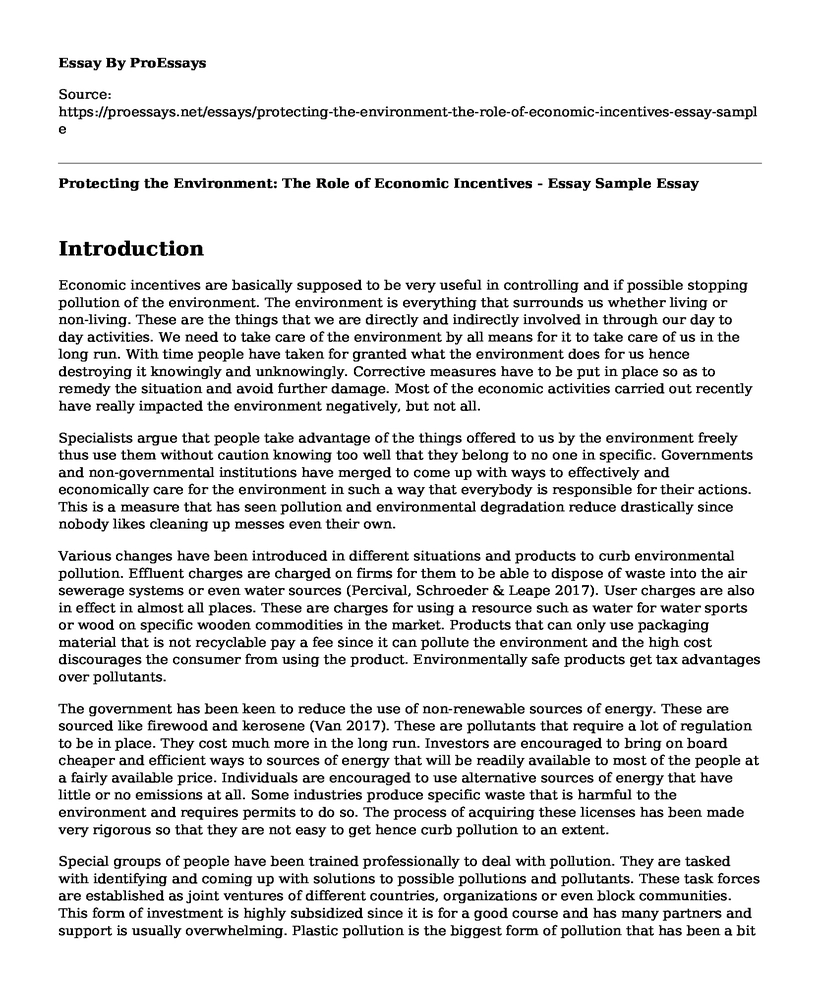Introduction
Economic incentives are basically supposed to be very useful in controlling and if possible stopping pollution of the environment. The environment is everything that surrounds us whether living or non-living. These are the things that we are directly and indirectly involved in through our day to day activities. We need to take care of the environment by all means for it to take care of us in the long run. With time people have taken for granted what the environment does for us hence destroying it knowingly and unknowingly. Corrective measures have to be put in place so as to remedy the situation and avoid further damage. Most of the economic activities carried out recently have really impacted the environment negatively, but not all.
Specialists argue that people take advantage of the things offered to us by the environment freely thus use them without caution knowing too well that they belong to no one in specific. Governments and non-governmental institutions have merged to come up with ways to effectively and economically care for the environment in such a way that everybody is responsible for their actions. This is a measure that has seen pollution and environmental degradation reduce drastically since nobody likes cleaning up messes even their own.
Various changes have been introduced in different situations and products to curb environmental pollution. Effluent charges are charged on firms for them to be able to dispose of waste into the air sewerage systems or even water sources (Percival, Schroeder & Leape 2017). User charges are also in effect in almost all places. These are charges for using a resource such as water for water sports or wood on specific wooden commodities in the market. Products that can only use packaging material that is not recyclable pay a fee since it can pollute the environment and the high cost discourages the consumer from using the product. Environmentally safe products get tax advantages over pollutants.
The government has been keen to reduce the use of non-renewable sources of energy. These are sourced like firewood and kerosene (Van 2017). These are pollutants that require a lot of regulation to be in place. They cost much more in the long run. Investors are encouraged to bring on board cheaper and efficient ways to sources of energy that will be readily available to most of the people at a fairly available price. Individuals are encouraged to use alternative sources of energy that have little or no emissions at all. Some industries produce specific waste that is harmful to the environment and requires permits to do so. The process of acquiring these licenses has been made very rigorous so that they are not easy to get hence curb pollution to an extent.
Special groups of people have been trained professionally to deal with pollution. They are tasked with identifying and coming up with solutions to possible pollutions and pollutants. These task forces are established as joint ventures of different countries, organizations or even block communities. This form of investment is highly subsidized since it is for a good course and has many partners and support is usually overwhelming. Plastic pollution is the biggest form of pollution that has been a bit hard to curb since plastic is readily available, convenient and very cheap compared to other products in the same line of purpose (Smith, Wheat & Stead). The best way to handle this is to impose very heavy and hefty taxes on all companies dealing in plastic as well as its products.
Everyone has a personal responsibility to control pollution in their own way either big or small. The environment has to always come first, a first priority in everything.
References
Percival, R. V., Schroeder, C. H., Miller, A. S., & Leape, J. P. (2017). Environmental regulation: Law, science, and policy. Wolters Kluwer Law & Business.
Smith, A., Wheat, P., & Stead, A. (2019). CAPEX bias and adverse incentives in incentive regulation: issues and solutions.
Van der Sluijs, J. (2017). Uncertainty, assumptions and value commitments in the knowledge base of complex environmental problems. In Interfaces between science and society (pp. 64-81). Routledge.
Cite this page
Protecting the Environment: The Role of Economic Incentives - Essay Sample. (2023, Feb 20). Retrieved from https://proessays.net/essays/protecting-the-environment-the-role-of-economic-incentives-essay-sample
If you are the original author of this essay and no longer wish to have it published on the ProEssays website, please click below to request its removal:
- Person-In-Environment Approach Essay Example
- Economics of International Trade Essay Example
- Nursing Shortage: Presenting the Problem Paper Example
- Essay Example on OSHA Compliance: Investigating Employee Complaints
- Harvest Rainwater Easily: Simple & Fancy Rain Barrels for Runoff Control - Essay Sample
- Essay Example on Sustainable Advancement: Impact on Environment and Per Capita Income
- Essay Example on Rising Poverty in Seoul: Impact of 21st Century Economic Crisis







